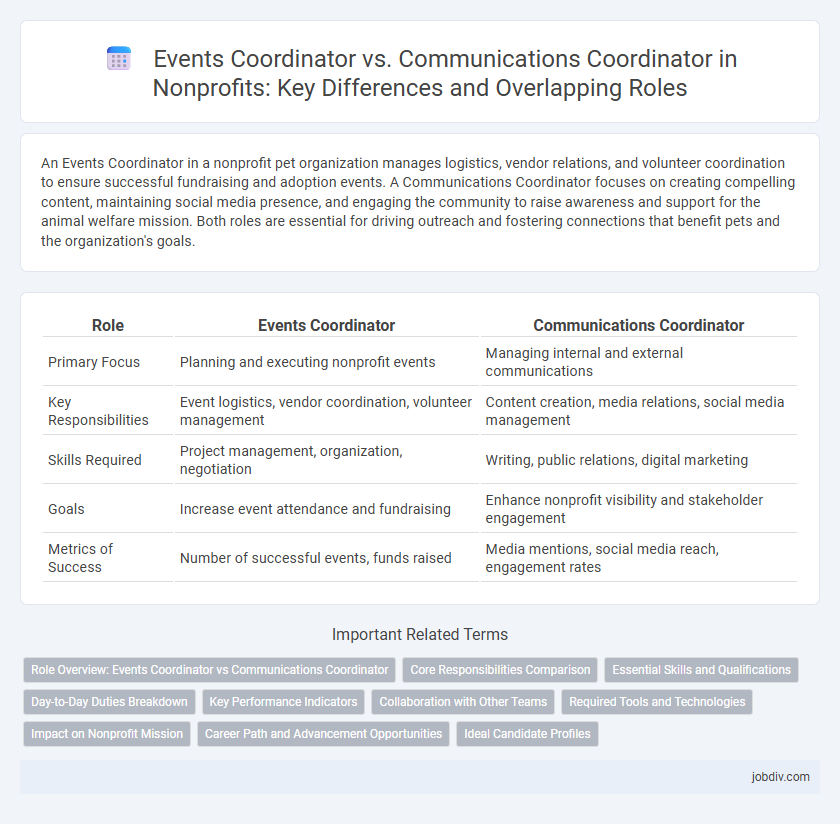An Events Coordinator in a nonprofit pet organization manages logistics, vendor relations, and volunteer coordination to ensure successful fundraising and adoption events. A Communications Coordinator focuses on creating compelling content, maintaining social media presence, and engaging the community to raise awareness and support for the animal welfare mission. Both roles are essential for driving outreach and fostering connections that benefit pets and the organization's goals.
Table of Comparison
| Role | Events Coordinator | Communications Coordinator |
|---|---|---|
| Primary Focus | Planning and executing nonprofit events | Managing internal and external communications |
| Key Responsibilities | Event logistics, vendor coordination, volunteer management | Content creation, media relations, social media management |
| Skills Required | Project management, organization, negotiation | Writing, public relations, digital marketing |
| Goals | Increase event attendance and fundraising | Enhance nonprofit visibility and stakeholder engagement |
| Metrics of Success | Number of successful events, funds raised | Media mentions, social media reach, engagement rates |
Role Overview: Events Coordinator vs Communications Coordinator
An Events Coordinator in a nonprofit organization manages planning, organizing, and executing events that promote fundraising and community engagement, ensuring logistical details and vendor coordination align with organizational goals. A Communications Coordinator focuses on crafting and distributing messaging across various channels, managing public relations, social media, and internal communications to enhance brand awareness and stakeholder engagement. Both roles are critical for nonprofit success, with Events Coordinators driving in-person or virtual interactions and Communications Coordinators shaping the narrative and outreach strategy.
Core Responsibilities Comparison
Events Coordinators in nonprofit organizations specialize in planning, organizing, and executing fundraising events, volunteer gatherings, and community outreach programs to enhance donor engagement and support. Communications Coordinators focus on crafting compelling messaging, managing social media platforms, maintaining public relations, and producing newsletters to increase awareness and promote the nonprofit's mission. Both roles require collaboration to ensure cohesive event promotion and consistent brand representation, but Events Coordinators emphasize logistics and participant experience, while Communications Coordinators prioritize strategic communication and audience engagement.
Essential Skills and Qualifications
Events Coordinators in nonprofits excel in project management, vendor negotiation, and logistics coordination, ensuring seamless event execution that maximizes donor engagement and fundraising outcomes. Communications Coordinators possess strong writing, public relations, and digital media skills, crafting compelling narratives to enhance the nonprofit's brand visibility and stakeholder outreach. Both roles require proficiency in time management, adaptability, and collaboration, with a deep understanding of the nonprofit sector's mission-driven environment.
Day-to-Day Duties Breakdown
Events Coordinators in nonprofits manage event logistics, vendor coordination, and volunteer scheduling to ensure smooth event execution. Communications Coordinators focus on crafting press releases, managing social media accounts, and maintaining donor communication to bolster public engagement. Both roles require collaboration with internal teams, but Events Coordinators prioritize operational details while Communications Coordinators emphasize messaging and brand consistency.
Key Performance Indicators
Events Coordinators in nonprofits focus on KPIs such as event attendance rates, budget adherence, and participant satisfaction scores to measure the success of fundraising and community engagement activities. Communications Coordinators track KPIs including media mentions, social media engagement, email open rates, and website traffic to evaluate outreach effectiveness and brand visibility. Both roles utilize data on volunteer involvement and donor feedback to optimize strategies and enhance organizational impact.
Collaboration with Other Teams
Events Coordinators in nonprofit organizations work closely with fundraising, volunteer, and program teams to ensure seamless event execution aligning with organizational goals. Communications Coordinators collaborate with marketing, development, and outreach departments to craft consistent messaging and amplify event promotion. Both roles require strategic teamwork to enhance community engagement and support mission-driven initiatives.
Required Tools and Technologies
Events Coordinators in nonprofits primarily utilize event management software like Eventbrite and Cvent, along with project management tools such as Asana or Trello to organize logistics, track timelines, and coordinate vendors. Communications Coordinators rely on content management systems (CMS) like WordPress, social media management platforms such as Hootsuite or Buffer, and email marketing tools like Mailchimp to craft and distribute messages effectively. Both roles demand proficiency in data analytics tools like Google Analytics to measure engagement and impact.
Impact on Nonprofit Mission
Events Coordinators drive donor engagement and community involvement through well-organized fundraising events, directly boosting nonprofit revenue and mission reach. Communications Coordinators shape public perception and stakeholder relationships by crafting clear, compelling messages, enhancing awareness and support for the nonprofit's goals. Both roles synergize to maximize impact, with Events focusing on active participation and Communications strengthening ongoing engagement.
Career Path and Advancement Opportunities
Events Coordinator roles in nonprofits often lead to senior event management or program director positions through gained expertise in logistics and stakeholder engagement. Communications Coordinators typically advance toward roles like communications manager or public relations director by developing strategic messaging and media relations skills. Both paths offer opportunities for growth, but Events Coordinators focus more on operational success while Communications Coordinators emphasize brand and community engagement.
Ideal Candidate Profiles
An ideal Events Coordinator for nonprofit organizations demonstrates expertise in logistics management, vendor relations, and donor engagement to execute successful fundraising and community events. In contrast, a Communications Coordinator excels in crafting compelling narratives, social media strategy, and stakeholder communication to enhance public awareness and support. Both roles require strong organizational skills and a passion for advancing the nonprofit's mission through targeted audience interaction.
Events Coordinator vs Communications Coordinator Infographic

 jobdiv.com
jobdiv.com